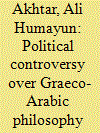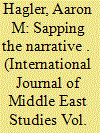| Srl | Item |
| 1 |
ID:
084332


|
|
|
| 2 |
ID:
139914


|
|
|
|
|
| Summary/Abstract |
During the reign of the Nasrid sultan Muhammad V in 14th-century Granada, the renowned literary figure Lisan al-Din ibn al-Khatib rose to the office of vizier and chief dignitary. A text on Graeco-Arabic philosophy and Sufism that he wrote under court patronage, Rawdat al-Taʿrif fi al-Hubb al-Sharif (The Garden of Knowledge of Noble Love), became the centerpiece of a famous court case against him that led to his downfall. Historians have had difficulty interpreting the case because of its political context. Was Ibn al-Khatib's demise really about his philosophical and mystical ideas given his entanglement in power rivalries at the court? Scholars have suggested that Ibn al-Khatib's text was used merely as a pretext to remove him from power. In contrast, I argue that the specific power rivalry between the chief qadi and Ibn al-Khatib only escalated into a court case because, at a time when Sufis were controversial, the qadi read Ibn al-Khatib's Sufi-inspired doctrines as a claim on his religious authority. Ibn al-Khatib's ideas, rather than a pretext for prosecution, were the necessary condition for the power rivalry to erupt into a court case. This reading of the case highlights the way intellectual debates shaped contingent political processes in the medieval Islamic world.
|
|
|
|
|
|
|
|
|
|
|
|
|
|
|
|
| 3 |
ID:
139913


|
|
|
|
|
| Summary/Abstract |
One mission of Ibn Kathir's Kitab al-Bidaya wa-l-Nihaya fi al-Taʾrikh (The Book of the Beginning and the End in History) is to provide a Sunni answer to a generally ʿAlid-legitimizing corpus of early Islamic historical accounts. Part of the 13th- and 14th-century movement that sought to rehabilitate the image of Syria and the otherwise reviled Umayyad dynasty (r. 661–750), Ibn Kathir's grand work of history cleverly reframes the early Islamic narrative to fit into what he considers a more “properly” Sunni framework than his sources provided. This article focuses on Ibn Kathir's presentation of the shūrā, the council appointed by ʿUmar and charged with choosing from among its six members his successor. It identifies the literary tools Ibn Kathir employed and offers a framework for his strategy of employing them. Whether through narrative aside or criticism of other historians, Ibn Kathir's recasting of a pro-ʿAlid grudge story as an Umayyad apologetic highlights moments of sectarian contention and emphasizes the evolution of Sunni opinion on Ali and Uthman.
|
|
|
|
|
|
|
|
|
|
|
|
|
|
|
|